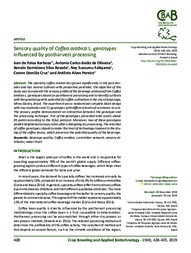Sensory quality of Coffea arabica L. genotypes influenced by postharvest processing.
Sensory quality of Coffea arabica L. genotypes influenced by postharvest processing.
Author(s): BARBOSA, I. de P.; OLIVEIRA, A. C. B. de; ROSADO, R. D. S.; SAKIYAMA, N. S.; CRUZ, C. D.; PEREIRA, A. A.; PEREIRA, A. A.
Summary: The specialty coffee market has grown significantly in the past decades and has several cultivars with productive potential. The objective of this study was to evaluate the sensory profile of the beverage produced from Coffea arabica L. genotypes based on postharvest processing and to identify cultivars with the greatest genetic potential for coffee cultivation in the city of Araponga, Minas Gerais, Brazil. The experiment was a randomized complete block design with two replicates and 11 genotypes with different levels of resistance to rust. The sensory profile demonstrated an interaction between the genotype and the processing technique. Five of the genotypes presented total scores above 85 points according to the SCAA protocol. Moreover, two of these genotypes yielded heightened sensory notes after undergoing dry processing. The selection of coffee genotypes should consider the level of technology involved in the drying of the coffee beans, which preserves the potential quality of the beverage.
Publication year: 2019
Types of publication: Journal article
Unit: Embrapa Coffee
Observation
Some of Embrapa's publications are published as ePub files. To read them, use or download one of the following free software options to your computer or mobile device. Android: Google Play Books; IOS: iBooks; Windows and Linux: Calibre.
Access other publications
Access the Agricultural Research Database (BDPA) to consult Embrapa's full library collection and records.
Visit Embrapa Bookstore to purchase books and other publications sold by Embrapa.

